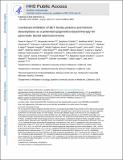Combined inhibition of BET family proteins and histone deacetylases as a potential epigenetics-based therapy for pancreatic ductal adenocarcinoma
Author(s)
Mazur, Pawel K.; Herner, Alexander; Mello, Stephano S.; Wirth, Matthias; Hausmann, Simone; Lofgren, Shane M.; Kuschma, Timo; Hahn, Stephan A.; Vangala, Deepak; Trajkovic-Arsic, Marija; Gupta, Aayush; Heid, Irina; Noel, Peter B.; Braren, Rickmer; Erkan, Mert; Kleeff, Jorg; Sipos, Bence; Sayles, Leanne C.; Heikenwalder, Mathias; Hessmann, Elizabeth; Ellenrieder, Volker; Esposito, Irene; Bradner, James E.; Khatri, Purvesh; Sweet-Cordero, E Alejandro; Attardi, Laura D.; Schmid, Roland M.; Schneider, Guenter; Sage, Julien; Siveke, Jens T.; Sanchez-Rivera, Francisco Javier; Jacks, Tyler E.; ... Show more Show less
DownloadJacks_Combined inhibition.pdf (2.027Mb)
OPEN_ACCESS_POLICY
Open Access Policy
Creative Commons Attribution-Noncommercial-Share Alike
Terms of use
Metadata
Show full item recordAbstract
Pancreatic ductal adenocarcinoma (PDAC) is one of the most lethal human cancers and shows resistance to any therapeutic strategy used. Here we tested small-molecule inhibitors targeting chromatin regulators as possible therapeutic agents in PDAC. We show that JQ1, an inhibitor of the bromodomain and extraterminal (BET) family of proteins, suppresses PDAC development in mice by inhibiting both MYC activity and inflammatory signals. The histone deacetylase (HDAC) inhibitor SAHA synergizes with JQ1 to augment cell death and more potently suppress advanced PDAC. Finally, using a CRISPR-Cas9–based method for gene editing directly in the mouse adult pancreas, we show that de-repression of p57 (also known as KIP2 or CDKN1C) upon combined BET and HDAC inhibition is required for the induction of combination therapy–induced cell death in PDAC. SAHA is approved for human use, and molecules similar to JQ1 are being tested in clinical trials. Thus, these studies identify a promising epigenetic-based therapeutic strategy that may be rapidly implemented in fatal human tumors.
Date issued
2015-09Department
Massachusetts Institute of Technology. Department of Biology; Koch Institute for Integrative Cancer Research at MITJournal
Nature Medicine
Publisher
Nature Publishing Group
Citation
Mazur, Pawel K; Herner, Alexander; Mello, Stephano S; Wirth, Matthias; Hausmann, Simone; Sánchez-Rivera, Francisco J; Lofgren, Shane M et al. “Combined Inhibition of BET Family Proteins and Histone Deacetylases as a Potential Epigenetics-Based Therapy for Pancreatic Ductal Adenocarcinoma.” Nature Medicine 21, no. 10 (September 2015): 1163–1171. © 2015 Macmillan Publishers Limited, part of Springer Nature
Version: Author's final manuscript
ISSN
1078-8956
1546-170X